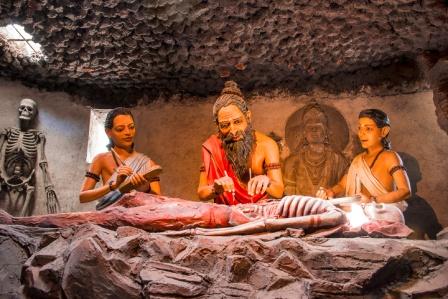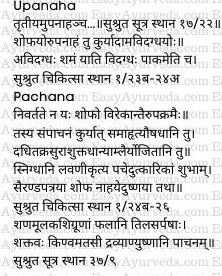Poultice (Upanaha) Meaning, Types, Clinical Significance, Uses
By Dr Raghuram Y.S. MD (Ay) & Dr Manasa, B.A.M.S
The Upanaha is a form of treatment wherein a thick paste of herbs is applied and then wrapped with a cloth or leather. It is used for various purposes such as inducing sweating, as a fomentation therapy and to cause quicker suppuration of wounds, abscesses, swellings etc.
Table of Contents
Upanaha as per Sushruta
Upanaha is the second type of treatment mentioned amongst ‘Sapta Upakrama’ i.e. the 7 types of treatments. These 7 treatments mentioned by Master Sushruta are meant to treat and heal the wounds, ulcers and related swelling and also to prevent their complications.

Upanaha
“Thirdly upanaha should be done…!” Upanaha treatment mentioned in Sapta Upakrama comprises of 2 procedures taken from the 60 treatments (Shashti Upakrama) which need to be selectively done as per condition of the wound. They are meant to provide warmth to the area around the wound to enhance suppuration so that the draining the contents would become easy.
Read – Shashti Upakrama Meaning, Classification, Clinical Significance
Types
Mainly 2 treatments are included under Upanaha. They are –
- Upanaha – poultice
- Pachana – helping the pus to form properly so that it can be drained easily
These procedures should be done after Avasechana if chronology needs to be followed. If the condition of the wound is fit to undergo one of these therapies they shall be skillfully chosen.
1. Upanaha – applying poultices or unguents
Upanaha means applying a poultice. It is a kind of sudation therapy. Here some medicines are tied in a bundle or bolus of a cloth. To provide sudation the medicines should be in ‘na-ati-ghana’ form i.e. not too much solid, it should be in a semisolid form.
Procedure – the medicaments are heated and applied on the body part and tied in a sterile cloth or leather. The covering keeps the heat trapped and with the heat, the medicinal principles from the herbs enter deep into the tissues.
Read – Kaphaja Upanaha (Netra Roga) – Definition, Symptoms, Treatment
In which conditions should upanaha be done?
Upanaha should be done in 2 conditions of vrana shotha i.e. swelling around wounds and ulcers –
- Ama / apakva shotha – immature swellings
- Vidagdha / ardhapakva shotha – partly matured swellings
When done in unripe swellings upanaha will bring about subsidence of these swellings. When done in partly ripened swellings upanaha will help in maturation of the swelling and bring about their ripening. This will further facilitate proper treatment of these conditions.
Read – Oedema – Ayurvedic Understanding, Treatment, Home Remedies
2. Pachana – causing suppuration of swelling
Pachana means bringing about maturation of swellings related to wounds and ulcers. These treatments will help in the formation of pus so that it can be drained easily and facilitate the treatment. Pachana can be done by administering medicines both internally and externally. In this context the pachana treatment should be done externally.
In what conditions should pachana treatment be done?
Pachana should be considered when the treatments mentioned in vimlapana and avasechana do not help in relieving the swelling around the wound or ulcer. Pachana should be done using the medicines mentioned in the Mishraka adhyaya.
Read – Pachana Karma: Physiology Of Digestion As Per Ayurveda
Sanskrit Verses

Method of conducting Pachana
The herbs mentioned to have properties to bring about suppuration of swelling (pachana herbs) should be chosen. They are –
- Shana – Crotalaria retusa
- Mulaka – radish
- Shigru phala – drumstick seeds
- Tila – sesame seeds
- Sarshapa – mustard seeds
- Shaktu – powder of barley, rice, parched rice etc is called shaktu
- Kinva – sediments of fermented herbal drinks
- Atasi – flax seed
- Anya ushna dravya – other herbs having hot potency
Preparation of utkarika
The powder of the above said herbs should be thoroughly mixed with curds, buttermilk, wine and other sour/fermented liquids. Ghee and salt is added, mixed and utkarika prepared. Utkarika means a poultice or a kind of sweetmeat. Hot utkarika should be tied in the leaves of castor plant and applied and tied on the afflicted part. Alternatively the utakarika should be wrapped in castor leaves; the bolus or poultice is heated on pan, applied on the swelling and tied in place.
Click to Consult Dr Raghuram Y.S. MD (Ayu)
Upanaha Sweda: Sweating therapy
Upanaha is also a form of sweating therapy.
As per Ashtanga Hrudayam Sutrasthana 17th chapter /2-5
Upanaha Sweda is application of poultice prepared from
Vacha (Acorus calamus), Kinva-yeast, Shatahva (Dill), Devadaru – (Himalayan cedar (bark) – Cedrus deodara) etc. Any kind of grains, all substances having pleasant smell, roots of Rasna (Pluchea lanceolata) and Castor (Eranda); or meat;
Each one added with more of salt, fats-oil ghee etc. Chukra- Vinegar, Takra-Buttermilk and milk. It is preferred in people with Vata imbalance–poultice are known as Salvana upanaha and should be applied often. 2-3
After applying the poultice, the part of the body should be bandaged with a soft piece of leather which does not have bad smell, which has been oiled; it should be slightly warmed and tied;
If leather is not available, leaves of plants which balance Vata, silk cloth, or woolen cloth may be used; poultice tied during night should be removed during day and that tied during day should be removed during night.4-5








